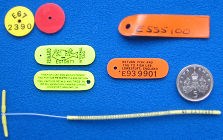Returning tagged fish and shellfish
We regularly tag fish in experiments to record fish behaviour, growth and fishing catch rates.
Most of the commercial species have been subject to tagging on all major fishing grounds so there is always the chance of finding a tagged fish wherever you're fishing.
Mark and recapture experiments use conventional "marker" tags (i.e., not data-storage or electronic tags). They can provide valuable insights into fish migrations and stock structure, which have important implications for fishery management. They can also provide useful information on growth and, in some circumstances, exploitation rates.
Electronic data storage tags (DSTs) allow scientists to continuously record the behaviour of individual fish between the points of release and recapture. This information helps us to interpret how fish live and respond to their environment.
The recovery of our tagged fish and the success of our tagging campaigns rely on the collaboration of the fishing industry and recreational anglers.

Fish tag returns
- Telephone our 24-hour tag-reporting hotline: +44 (0) 1502 524526
- Complete our online fish tag return form
- Email: FTH@cefas.co.uk
- Either complete and print out this fish tag return form (PDF, 37 KB). Post it with the tag to Fish Tag Returns, Cefas, Pakefield Road, Lowestoft, Suffolk NR33 0HT, UK
- Or return the tag and fish (if possible) with details of where and when it was caught to your local Marine Management Organisation (MMO) office.
Rewards
We will pay £6 for conventional tags, plus the market value of the fish and any postage incurred.
For DST-tagged fish, we also pay a reward, value dependent on project.
It is very important to record the full recapture details, including:
- the tag number and colour
- the date the tag/fish was caught
- where the tag/fish was caught (if possible latitude and longitude)
- the sex, length and weight of the fish/shellfish.
Shellfish tag returns
Data on the movement and growth of crabs is lacking, so it is very important that when you catch a tagged crab you record the
- tag colour and number
- date
- location (latitude and longitude)
- sex
- crab's size (carapace width in mm).
To return the tag and crab with the relevant details:
- telephone our 24-hour tag-reporting hotline: +44 (0) 1502 524526
- complete our online shellfish tag return form
- email: FTH@cefas.co.uk
- either complete and print out this shellfish tag return form (PDF, 37 KB). Post it with the tag to Fish Tag Returns, Cefas, Pakefield Road, Lowestoft, Suffolk NR33 0HT, UK
- or contact your local Marine Management Organisation (MMO) office or your local Sea Fishery Committee (SFC) / Inshore Fisheries and Conservation Authority (IFCA) office.
Rewards
We will pay £6 for conventional T-bar tags and a reward for storage tags (DSTs) when you supply the full recapture details (see above) AND the return of the crab please.


